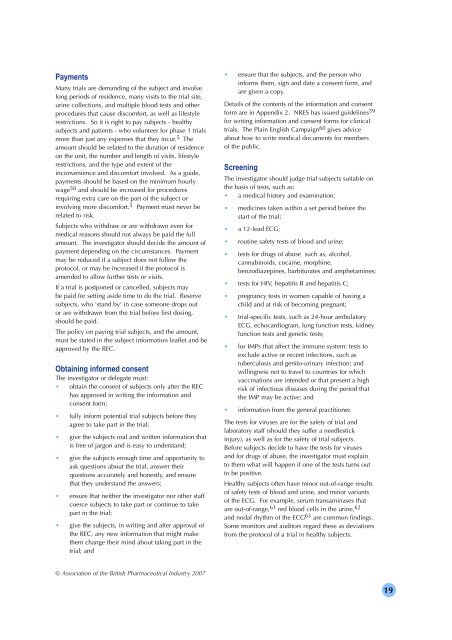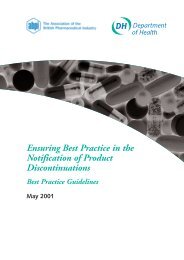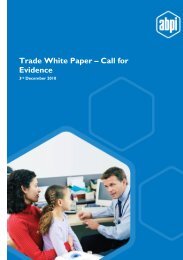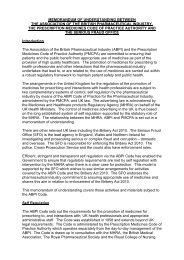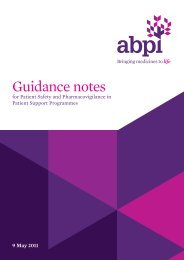ABPI Guidelines for Phase 1 Clinical Trials (PDF
ABPI Guidelines for Phase 1 Clinical Trials (PDF
ABPI Guidelines for Phase 1 Clinical Trials (PDF
Create successful ePaper yourself
Turn your PDF publications into a flip-book with our unique Google optimized e-Paper software.
Payments<br />
Many trials are demanding of the subject and involve<br />
long periods of residence, many visits to the trial site,<br />
urine collections, and multiple blood tests and other<br />
procedures that cause discom<strong>for</strong>t, as well as lifestyle<br />
restrictions. So it is right to pay subjects - healthy<br />
subjects and patients - who volunteer <strong>for</strong> phase 1 trials<br />
more than just any expenses that they incur. 5 The<br />
amount should be related to the duration of residence<br />
on the unit, the number and length of visits, lifestyle<br />
restrictions, and the type and extent of the<br />
inconvenience and discom<strong>for</strong>t involved. As a guide,<br />
payments should be based on the minimum hourly<br />
wage 58 and should be increased <strong>for</strong> procedures<br />
requiring extra care on the part of the subject or<br />
involving more discom<strong>for</strong>t. 5 Payment must never be<br />
related to risk.<br />
Subjects who withdraw or are withdrawn even <strong>for</strong><br />
medical reasons should not always be paid the full<br />
amount. The investigator should decide the amount of<br />
payment depending on the circumstances. Payment<br />
may be reduced if a subject does not follow the<br />
protocol, or may be increased if the protocol is<br />
amended to allow further tests or visits.<br />
If a trial is postponed or cancelled, subjects may<br />
be paid <strong>for</strong> setting aside time to do the trial. Reserve<br />
subjects, who 'stand by' in case someone drops out<br />
or are withdrawn from the trial be<strong>for</strong>e first dosing,<br />
should be paid.<br />
The policy on paying trial subjects, and the amount,<br />
must be stated in the subject in<strong>for</strong>mation leaflet and be<br />
approved by the REC.<br />
Obtaining in<strong>for</strong>med consent<br />
The investigator or delegate must:<br />
• obtain the consent of subjects only after the REC<br />
has approved in writing the in<strong>for</strong>mation and<br />
consent <strong>for</strong>m;<br />
• fully in<strong>for</strong>m potential trial subjects be<strong>for</strong>e they<br />
agree to take part in the trial;<br />
• give the subjects oral and written in<strong>for</strong>mation that<br />
is free of jargon and is easy to understand;<br />
• give the subjects enough time and opportunity to<br />
ask questions about the trial, answer their<br />
questions accurately and honestly, and ensure<br />
that they understand the answers;<br />
• ensure that neither the investigator nor other staff<br />
coerce subjects to take part or continue to take<br />
part in the trial;<br />
• give the subjects, in writing and after approval of<br />
the REC, any new in<strong>for</strong>mation that might make<br />
them change their mind about taking part in the<br />
trial; and<br />
© Association of the British Pharmaceutical Industry 2007<br />
• ensure that the subjects, and the person who<br />
in<strong>for</strong>ms them, sign and date a consent <strong>for</strong>m, and<br />
are given a copy.<br />
Details of the contents of the in<strong>for</strong>mation and consent<br />
<strong>for</strong>m are in Appendix 2. NRES has issued guidelines 59<br />
<strong>for</strong> writing in<strong>for</strong>mation and consent <strong>for</strong>ms <strong>for</strong> clinical<br />
trials. The Plain English Campaign 60 gives advice<br />
about how to write medical documents <strong>for</strong> members<br />
of the public.<br />
Screening<br />
The investigator should judge trial subjects suitable on<br />
the basis of tests, such as:<br />
• a medical history and examination;<br />
• medicines taken within a set period be<strong>for</strong>e the<br />
start of the trial;<br />
• a 12-lead ECG;<br />
• routine safety tests of blood and urine;<br />
• tests <strong>for</strong> drugs of abuse such as, alcohol,<br />
cannabinoids, cocaine, morphine,<br />
benzodiazepines, barbiturates and amphetamines;<br />
• tests <strong>for</strong> HIV, hepatitis B and hepatitis C;<br />
• pregnancy tests in women capable of having a<br />
child and at risk of becoming pregnant;<br />
• trial-specific tests, such as 24-hour ambulatory<br />
ECG, echocardiogram, lung function tests, kidney<br />
function tests and genetic tests;<br />
• <strong>for</strong> IMPs that affect the immune system: tests to<br />
exclude active or recent infections, such as<br />
tuberculosis and genito-urinary infection; and<br />
willingness not to travel to countries <strong>for</strong> which<br />
vaccinations are intended or that present a high<br />
risk of infectious diseases during the period that<br />
the IMP may be active; and<br />
• in<strong>for</strong>mation from the general practitioner.<br />
The tests <strong>for</strong> viruses are <strong>for</strong> the safety of trial and<br />
laboratory staff (should they suffer a needlestick<br />
injury), as well as <strong>for</strong> the safety of trial subjects.<br />
Be<strong>for</strong>e subjects decide to have the tests <strong>for</strong> viruses<br />
and <strong>for</strong> drugs of abuse, the investigator must explain<br />
to them what will happen if one of the tests turns out<br />
to be positive.<br />
Healthy subjects often have minor out-of-range results<br />
of safety tests of blood and urine, and minor variants<br />
of the ECG. For example, serum transaminases that<br />
are out-of-range, 61 red blood cells in the urine, 62<br />
and nodal rhythm of the ECG 63 are common findings.<br />
Some monitors and auditors regard these as deviations<br />
from the protocol of a trial in healthy subjects.<br />
19


